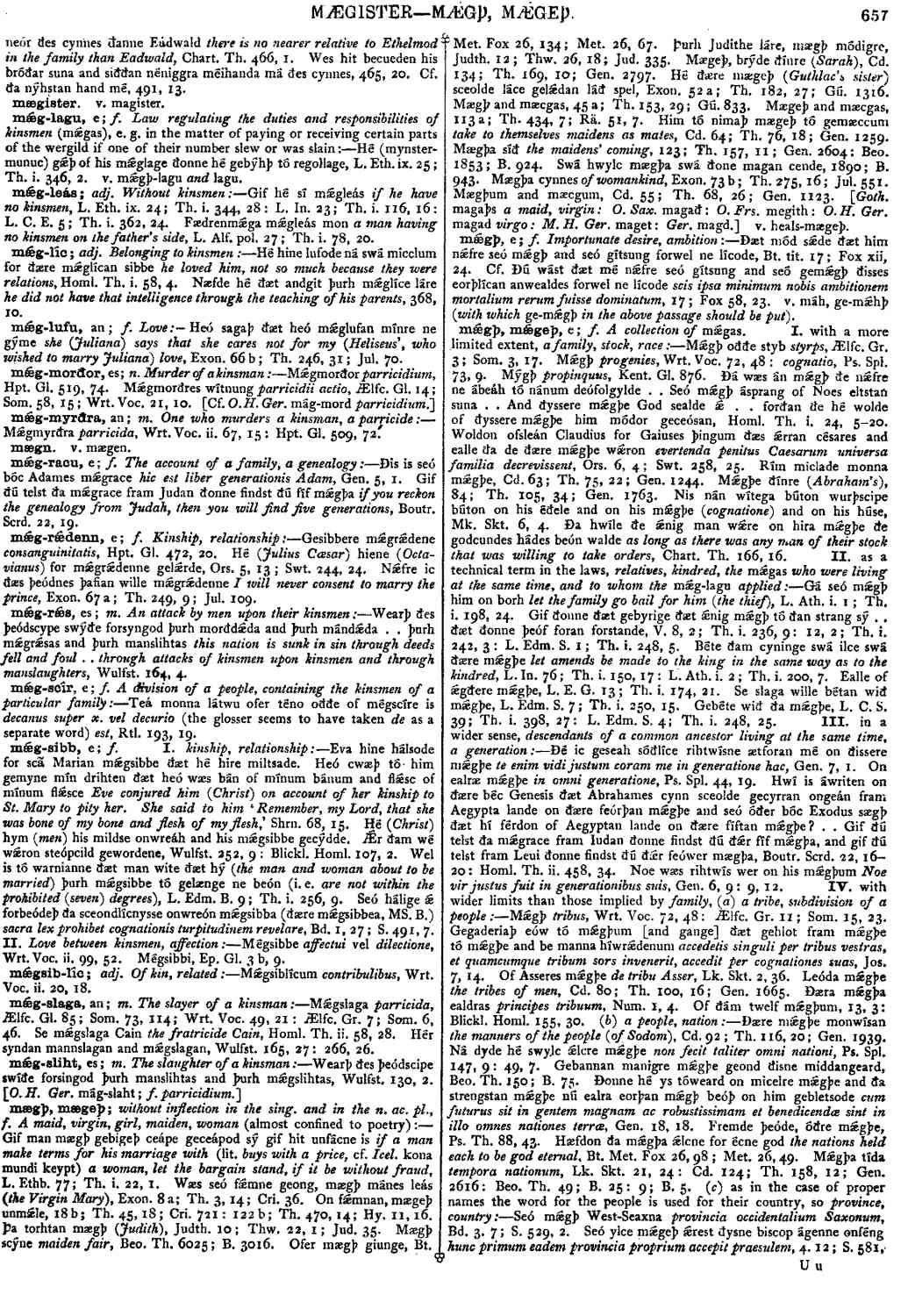mǽgþ
- noun [ feminine ]
-
Mǽgþ oððe styb
styrps,
- Ælfc. Gr. 3 ;
- Som. 3, 17.
-
Mǽgþ
progenies,
- Wrt. Voc. 72, 48:
cognatio,
- Ps. Spl. 73, 9.
-
Mýgþ
propinquus,
- Kent. Gl. 876.
-
Ðá wæs án mǽgþ ðe nǽfre ne ábeáh tó nánum deófolgylde . . Seó mǽgþ ásprang of Noes eltstan suna . . And ðyssere mǽgþe God sealde ǽ . . forðan ðe hé wolde of ðyssere mǽgþe him módor geceósan,
- Homl. Th. i. 24, 5-20.
-
Woldon ofsleán Claudius for Gaiuses þingum ðæs ǽrran césares and ealle ða de ðære mǽgþe wǽron
evertenda penitus Caesarum universa familia decrevissent,
- Ors. 6, 4 ;
- Swt. 258, 25.
-
Rím miclade monna mǽgþe,
- Cd. 63 ;
- Th. 75, 22 ;
- Gen. 1244.
-
Mǽgþe ðínre (
Abraham's
),- 84 ;
- Th. 105, 34 ;
- Gen. 1763.
-
Nis nán wítega búton wurþscipe búton on his éðele and on his mǽgþe
(cognatione
)and on his húse,
- Mk. Skt. 6, 4.
-
Ða hwíle ðe ǽnig man wǽre on hira mǽgþe ðe godcundes hádes beón walde
as long as there was any man of their stock that was willing to take orders,
- Chart. Th. 166, 16.
-
Gá seó mǽgþ him on borh
let the family go bail for him (the thief ),
- L. Ath. i. 1 ;
- Th. i. 198, 24.
-
Gif ðonne ðæt gebyrige ðæt ǽnig mǽgþ tó ðan strang sý . . ðæt ðonne þeóf foran forstande,
- V. 8, 2 ;
- Th. i. 236, 9: 12, 2 ;
- Th. i. 242, 3: L. Edm. S. 1 ;
- Th. i. 248, 5.
-
Béte ðam cyninge swá ilce swá ðære mǽgþe
let amends be made to the king in the same way as to the kindred,
- L. In. 76 ;
- Th. i. 150, 17: L. Ath. i. 2 ;
- Th. i. 200, 7.
-
Ealle of ǽgðere mǽgþe,
- L. E. G. 13 ;
- Th. i. 174, 21.
-
Se slaga wille bétan wið mǽgþe,
- L. Edm. S. 7 ;
- Th. i. 250, 15.
-
Gebéte wið ða mǽgþe,
- L. C. S. 39 ;
- Th. i. 398, 27: L. Edm. S. 4 ;
- Th. i. 248, 25.
-
Ðé ic geseah sóðlíce rihtwísne ætforan mé on ðissere mǽgþe
te enim vidi justum coram me in generatione hac,
- Gen. 7, 1.
-
On ealræ mǽgþe
in omni generatione,
- Ps. Spl. 44, 19.
-
Hwí is áwriten on ðære béc Genesis ðæt Abrahames cynn sceolde gecyrran ongeán fram Aegypta lande on ðære feórþan mǽgþe and seó óðer bóc Exodus sægþ ðæt hí férdon of Aegyptan lande on ðære fíftan mǽgþe? . . Gif ðú telst ða mǽgrace fram Iudan ðonne findst ðú ðǽr fíf mǽgþa, and gif ðú telst fram Leui ðonne findst ðú ðǽr feówer mægþa,
- Boutr. Scrd. 22, 16-20: Homl. Th. ii. 458, 34.
-
Noe wæs rihtwís wer on his mǽgþum
Noe vir justus fuit in generationibus suis,
- Gen. 6, 9: 9, 12.
-
Mǽgþ
tribus,
- Wrt. Voc. 72, 48: Ælfc. Gr. 11 ;
- Som. 15, 23.
-
Gegaderiaþ eów tó mǽgþum [and gange] ðæt gehlot fram mǽgþe tó mǽgþe and be manna híwrǽdenum
accedetis singuli per tribus vestras, et quamcumque tribum sors invenerit, accedit per cognationes suas,
- Jos. 7, 14.
-
Of Asseres mǽgþe
de tribu Asser,
- Lk. Skt. 2, 36.
-
Leóda mǽgþe
the tribes of men,
- Cd. 80 ;
- Th. 100, 16 ;
- Gen. 1665.
-
Ðæra mǽgþa ealdras
principes tribuum,
- Num. 1, 4.
-
Of ðám twelf mǽgþum,
- 13, 3: Blickl. Homl. 155, 30.
-
Ðære mǽgþe monwísan
the manners of the people (of Sodom ),
- Cd. 92 ;
- Th. 116, 20 ;
- Gen. 1939.
-
Ná dyde hé swylc ǽlcre mǽgþe
non fecit taliter omni nationi,
- Ps. Spl. 147, 9: 49, 7.
-
Gebannan manigre mǽgþe geond ðisne middangeard,
- Beo. Th. 150 ;
- B. 75.
-
Ðonne hé ys tóweard on micelre mǽgþe and ða strengstan mǽgþe nú ealra eorþan mǽgþ beóþ on him gebletsode
cum futurus sit in gentem magnam ac robustissimam et benedicendæ sint in illo omnes nationes terræ,
- Gen. 18, 18.
-
Fremde þeóde, óðre mǽgþe,
- Ps. Th. 88, 43.
-
Hæfdon ða mǽgþa ǽlcne for écne god
the nations held each to be god eternal,
- Bt. Met. Fox 26, 98 ;
- Met. 26, 49.
-
Mǽgþa tída
tempora nationum,
- Lk. Skt. 21, 24: Cd. 124 ;
- Th. 158, 12 ;
- Gen. 2616: Beo. Th. 49 ;
- B. 25: 9 ;
- B. 5.
-
Seó mǽgþ West-Seaxna
provincia occidentalium Saxonum,
- Bd. 3. 7 ;
- S. 529, 2.
-
Seó ylce mǽgeþ ǽrest ðysne biscop ágenne onféng
hunc primum eadem provincia proprium accepit praesulem,
- 4, 12 ;
- S. 581,24.
-
Willferþ bisceop Súþ-Seaxna mǽgþe
(provinciæ),
- 4, 13 ;
- S. 581, 37.
-
From Armoricano ðære mǽgeþe,
- 1, 1 ;
- S. 474, 7.
-
Mid his mǽgþe Eást-Englum,
- 2, 15 ;
- S. 518, 27.
-
On Beornicia mǽgþe,
- 2, 14 ;
- S. 518, 14.
-
Hé férde geond ealle Angelcynnes mǽgþe
perlustrans universa,
- 4. 2 ;
- S. 566, I.
-
Him twá mǽgþe
(duas provincias
)forgeaf,
- 4, 13 ;
- S. 582, 10.
-
Ða mǽgþe ðe mon háteþ Gallia Belgica,
- 1, 1 ;
- S. 473, 12.
-
On Palestina ðære mǽgþe,
- Shrn. 100, 26.
-
On Tiro ðære mǽgþe,
- Th. Ap. 3, 24: Blickl. Homl. 211, 16: Andr. Kmbl. 528 ;
- An. 264.
Bosworth, Joseph. “mǽgþ.” In An Anglo-Saxon Dictionary Online, edited by Thomas Northcote Toller, Christ Sean, and Ondřej Tichy. Prague: Faculty of Arts, Charles University, 2014. https://bosworthtoller.com/22118.
Checked: 1